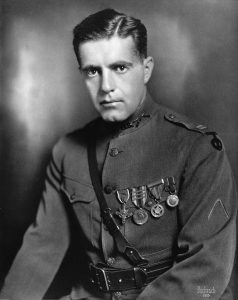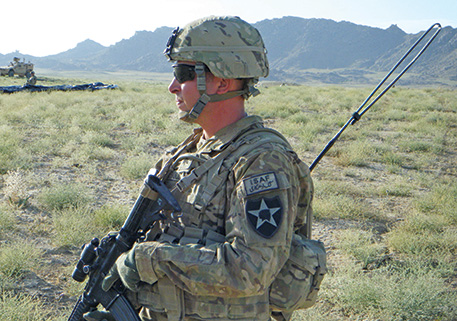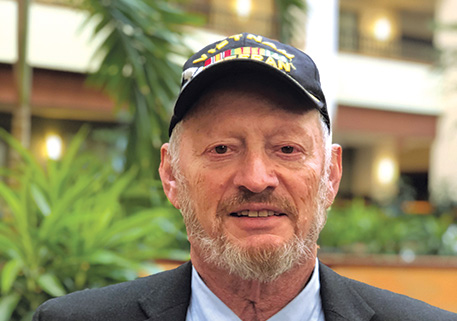
In 1919, Marine veteran Albert Rindsberg was staying at the Harrison Club hotel in Cincinnati when he wandered into a heated conversation. A group of veterans were talking about how little was being done for disabled veterans in America. Rindsberg had been discharged the previous year—changed through his service in World War I—so the conversation caught his interest.
The Great War had ended, and although a sense of victory and patriotism should have swept the nation, those feelings were overshadowed by a global influenza pandemic and a brutal postwar economy. Over 200,000 American injured servicemen returned home to a country that was not prepared to help them, resulting in thousands of veterans without jobs or proper medical care.
As Rindsberg listened, he was enthralled by the charismatic and thought-provoking points made by a fellow disabled veteran. That young man, Robert S. Marx, was the newly elected judge for the Cincinnati Superior Court.
That meeting would plant the seed for what would become Disabled American Veterans of the World War, and alongside Marx, Rindsberg would go on to become a founding member.
“We had a common experience which bound us together,” Marx said about his idea to form a group to protect the interests of disabled veterans. “And we ought to continue through an organization of our own—an organization of us, by us and for us.”
“The issues that disabled veterans were facing then are not entirely dissimilar from those which they face today,” said National Commander Butch Whitehead. “The difference, of course, was that the resources available to them were far fewer. This is what Judge Marx set out to change.”
Marx had spent the better part of two years in combat tending to the needs of his men, often in dismal conditions and through unrelenting hardship. His own experiences and injuries during the war helped him develop a deep commitment to the care of his fellow soldiers and ultimately his fellow veterans.
In 1918, on a long and winding road from the regimental headquarters to Baâlon, France, Marx and his battalion came across several German prisoners being escorted behind the lines. He questioned them as he and his men were approaching unknown territory as part of the Meuse-Argonne Offensive.
“I could get little information out of them except that the Germans had retreated during the night and occupied the hill behind Baâlon and not the town itself,” Marx documented.
The hill overlooked the town, which could not be entered and occupied until Marx and his men had driven the Germans off the ridge. From atop the hill, German forces rained fire down upon Marx and his battalion as they tucked away in the brush and tall grass.
Marx knew that he had to take the village. He ordered part of the battalion to lay down fire as he would lead the rest of the unit, low-crawling to the town.
“The barrage was intense, and the shells began to drop with alarming accuracy near our battalion group,” Marx recorded in his account. “It seemed to us as if the range was lengthening, so we continued to advance. Then a shell struck almost in our midst. I did not hear it coming, and I seemed to be hit before I knew it or heard the noise. I only knew that I was hit in the head.”
According to his men, before slipping out of consciousness, Marx urged them on, repeating the words, “Give ’em hell.”
One of the men in Marx’s battalion crawled over to Marx and shouted over the gunfire, asking if he could walk. Marx awoke and helped lay down fire and direct his troops for as long as he could.
Ten minutes later, stretcher bearers in gas masks picked him up. As they carried him to safety and he faded in and out of consciousness, he saw shells sweeping the area.
“The number of gas shells used was so large that the stretcher bearers had to put my gas mask on in spite of all my head wounds,” Marx later said. “I did not suffer so much, but that I could not help marveling even in that state, at the courage of the men who persisted in carrying me back three long kilometers without regard to the peril or danger to them.”
That day was Nov. 10, and doctors would begin surgery on Marx around midnight. “I hovered between life and death in this hospital,” Marx recounted, unaware that the following morning, the Allies and German forces would sign the armistice, ending the war.
“In the morning, the surgeon, Captain J.P. Wall, answered my first question,” Marx recalled in his writings. “I wanted to know how soon I could rejoin my outfit. He said, ‘I guess there is no hurry, boy, the war is all over.’”
The so-called “war to end all wars,” even in its last hours, had proved deadly for many—2,738 men perished in that final day, right up until the bugle call sounded the start of the armistice. Historians estimate another 8,100 more were wounded or went missing, adding to the millions of casualties suffered during the course of the four-year conflict.
By all accounts, Marx was a hero; he received the Distinguished Service Cross, the nation’s second highest honor for valor, for his actions. But he still came home and faced the same reality as every other disabled veteran—the nation was not prepared to provide them the care and support they needed in the aftermath of the war.
When Marx returned home to Cincinnati, he was quickly elected the youngest judge to the Cincinnati Superior Court. He would also go on to have a storied law career as a skilled trial attorney as well as teach at his alma mater, the University of Cincinnati Law School. (Its library would eventually bear his name.) He even created a course, simply called “Facts,” that went on to be taught at law universities around the country.
With everything Marx had done for his country, his community and his professional field, it never would come close to the lasting effect he would have on millions of Americans for the next 100 years.
On that Christmas Day in 1919, when Marx gathered a group of disabled veterans together for dinner and camaraderie, he may not have realized the full magnitude of what he was setting in motion. But it was to be a pivotal moment for generations to come.
Marx spent the remainder of his life in the pursuit of justice—both for veterans and his fellow Americans. A friend and adviser to Franklin D. Roosevelt, he gave voice to those who could not speak up for themselves.
“When we say ‘keeping promises,’ it harkens back to Judge Marx and the ideas our founders espoused. The idea is that our nation makes a promise to make whole the veterans who are changed as a result of military service,” said Marc Burgess, DAV national adjutant. “It’s a unique social contract. It’s why, when we talk about veterans care and benefits, we say they are earned. They are part of a sacred promise.
“We think Judge Marx would be proud of the organization he and his fellow veterans started. He’d appreciate how inclusive we are and the progress we’ve made over these many years,” Burgess continued. “Even now, 60 years after his death, his legacy lives on to help veterans of all generations get the health care, education and disability benefits they earned.”
With more than 1 million members currently filling the ranks of the organization Marx created a century ago, DAV continues to help the men and women who have served our country, as well as their families—all in the footsteps of the man who believed to his core in the cause of caring for the nation’s veterans.
As part of the 2020 National Defense Authorization Act (NDAA), a “Review of World War I Valor Medals” initiative provides a pathway for medals, including the Navy Cross, Distinguished Service Cross and Air Force Cross, to be upgraded to the Medal of Honor. The program includes review of the service records of African American, Asian American, Hispanic American, Jewish American, and Native American war veterans. DAV has worked with the Department of the Army to submit an application for past National Commander Robert Marx’s Distinguished Service Cross to be considered for an upgrade to the Medal of Honor. The results of the application will be available by 2023.






